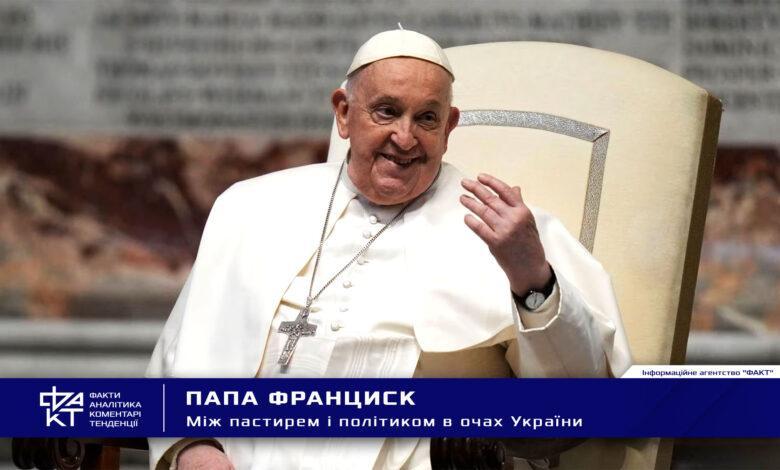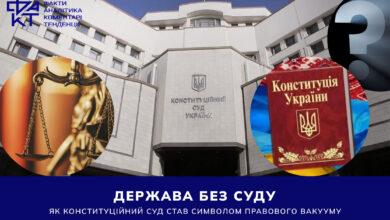The Pope during times of genocide, wars, and reconciliation: what Pope Francis has done and has not done for Ukraine.

Pope Francis, a figure who managed to surprise the world with his unconventional pontificate and went down in history as the first pontiff from America to ask for forgiveness for the sins of the Church before the indigenous peoples of Canada, died at the age of 88.
His death is not only the end of an era, but also a reminder of the fragility of human life, even if that life is lived in the center of spiritual power. The Pope, who was called “the Pope for the people” for his simplicity, sincerity and courage to go beyond established dogmas, left a controversial but deeply human mark. His desire to make the Church more open, closer to the marginalized, caused both enthusiasm and resistance – and this also revealed the living tension of our time between tradition and the search for a new way.
The news of his death was read by Cardinal Kevin Farrell in the chapel of the House of Saint Martha in the Vatican, where Pope Francis chose to live, having renounced the luxury of the Apostolic Palace.
“Today at 7:35 a.m., the Bishop of Rome, Francis, returned to the Father’s house. His whole life was devoted to the service of the Lord and His Church,” — said Farrell.
Bells rang over Rome. The towers of the temples silently announced to the world that another lamp had gone out. But the flame he ignited in the hearts of believers—and not only believers—will not be extinguished so quickly.
Papa had serious health problems since his youth: he had part of his right lung removed due to an infection. The last months were difficult – first bronchitis, and later bilateral pneumonia with an asthmatic component. Despite the doctor’s assurances that his condition was “satisfactory”, his body could not withstand it.
Francis left us a lesson – about the power of humility, about the price of truth, about the need to ask for forgiveness and seek reconciliation. His death is not just the loss of a spiritual leader. It’s a reminder that even those who wear white and bless millions eventually depart to a place where there are no titles, only soul.
Pope Francis’ Legacy in Canada: When Repentance Becomes an Act of Historical Justice
Among the many pages of the pontificate of Francis, a special place sits his deep, humane and courageous appeal to the indigenous peoples of Canada – those who for centuries remained in the shadow of imperial, church and state traumas. In 2022, after decades of waiting, the Pope finally asked for forgiveness, first in the Vatican and later on Canadian soil, during a six-day visit that marked a turning point in the history of relations between the Church and indigenous communities.
It there was remorse not only personal, but also institutional, symbolic, historical. On July 25, 2022, Pope Francis said on the site of one of the former boarding schools in Maskwasis, where orders were once heard and the truth was silent:
“I am here because the first step of my penitential pilgrimage among you is to ask for forgiveness once again. To repeat to you that I am sincerely sorry. It is a pity that, unfortunately, many Christians supported the colonial thinking of the authorities that oppressed the indigenous peoples.”
These words came out in his native Spanish and were translated into English. They received a response – applause, tears, silent looks. It was no simple ceremony. It was a gesture that echoed the centuries-old longing for the truth.
The history of forced assimilation boarding schools in Canada under the leadership of the Roman Catholic Church is not just a dark page of the past. This is a living wound. Forced denationalization, physical and sexual violence, systemic destruction of identity, malnutrition, coldness, indifference. Tens of thousands of children were separated from their families, hundreds never returned. Their names are still being searched for on anonymous graves.
Phil Fontaine, the former national chairman of the Assembly of First Nations and himself a graduate of such a school, called the moment of meeting with the Pope historic:
“Without forgiveness, there is no forgiveness. And without forgiveness, there is no healing,” he said a year after the visit.
Of course, not everyone accepted the apology unambiguously. Some believed that the Pope should have gone further. But even during his return to Rome, he admitted: what happened is genocide. And this recognition also has an important power — the power to call a spade a spade.
In March 2023, under pressure from indigenous communities, the Vatican officially rejected the so-called Doctrine of discovery — a colonial document that legitimized the seizure of indigenous lands for centuries.
Yes, no words will bring back those who did not return home. No apology will remove the burden of generations. But meaningful, sincere remorse is the first step on the path where justice begins to sound not like an abstraction, but like a promise of action. As Cornell McLean, interim Grand Chief of the Assembly of Manitoba Chiefs, said at the time:
“An apology does not reduce the pain of lost children. But we call on the Church to follow the path of reconciliation – through concrete actions and real compensation.”
Pope Francis has shown that even the largest religious institution can bow its head. And in this inclination there is a higher dignity.
Pope Francis and Ukraine: between the pain of war and the search for an uncomfortable peace
Pope Francis’ attitude to the war in Ukraine since the beginning of the full-scale invasion of Russia in 2022 has been complex, ambiguous and at the same time imbued with genuine anxiety. His voice sounded all over the world as a call for peace, but for many Ukrainians these words seemed not decisive enough, too cautious, and sometimes even offensive.
Until February 24, 2022, Pope Francis avoided direct references to Russia in the context of aggression. Back in 2019, during a meeting with representatives of the Ukrainian Greek Catholic Church, the pontiff called the conflict in Donbas a “hybrid war” and expressed concern about the humanitarian situation. At the same time, even after personal meetings with Vladimir Putin, he refrained from sharply criticizing the Russian leadership.
After the start of the full-scale invasion, Pope Francis already personally visited the Russian embassy to the Holy See on February 25, 2022 to express his concern about the war, an unprecedented step in Vatican diplomatic practice. On March 6, 2022, he publicly called: “In the name of God, stop this massacre!”, calling Mariupol “martyr city”.
In January 2024, the Pope for the first time clearly recognized Russia as an aggressor, mentioning “almost two years of large-scale war that Russia is waging against Ukraine”.
Calls for peace and truce
From the first days of the full-scale war, the pontiff called for peace. He spoke about the end of violence, the need for humanitarian aid and joint prayers for Ukraine.
In December 2024, he offered “christmas truce” — not only in Ukraine, but also in all zones of armed conflicts. And in February 2025, on the third anniversary of the full-scale invasion, the Pope named this date”a painful and shameful anniversary for all humanity”.
On Easter 2025, Francis was no longer able to personally address the faithful, but his blessing included words about Ukraine.ravaged by war”, and a call for a just peace.
Controversial statements: from the white flag to “cousins”
The pontiff repeatedly made statements that caused misunderstanding or indignation in Ukraine. For example, in August 2022, on the Independence Day of Ukraine, he named to Darya Dugin, who died as a result of an explosion in the suburbs of Moscowan innocent victim of war”. This gesture caused disappointment in Ukraine.
In March 2024, in an interview with Swiss television, Pope Francis saidthat “the one who has the courage to raise the white flag and negotiate is stronger”. Despite the Vatican’s explanation that it was a metaphor for a truce, not a surrender, the Pope’s words provoked a harsh reaction from Kyiv.
Even earlier, the pontiff called a Russian “great nation”, spoke with respect to “of Russian humanism” and mentioned about “NATO barking at Russia’s borders”, which, according to him, could provoke a war. Such wording was often criticized as a reproduction of Russian propaganda.
In February 2025, he urged Ukrainians “don’t answer blow for blow” and “to forgive”, recognizing at the same time the deep wounds left by war.
Also in his sermon on the island of Corsica, Francis said: “Ukrainians and Russians are cousins. Let them understand each other!”
Crusade in 2022: outrage in Ukraine
One of the loudest diplomatic scandals in relations between Ukraine and the Vatican was the Holy Cross Procession in the Colosseum on Good Friday in April 2022. During it, two women – a Ukrainian and a Russian – carried the cross. This symbolic gesture was aimed at reconciliation, but was perceived in Ukraine as an attempt to humiliate the aggressor and the victim.
The Ministry of Foreign Affairs of Ukraine, the Ukrainian Greek-Catholic Church and the Orthodox Church of Ukraine issued criticism, saying that such a “gesture” does not take into account the context of the war and is painful for Ukrainians. In the following years, the Vatican avoided a similar format of participation of representatives of Russia and Ukraine in processions.
Another episode is a speech in the Vatican in August 2023, when the Pope addressed young people from Russia with words about “the legacy of great Russia – Peter I, Catherine II.” Despite the attempt to present these words as a call for dialogue, in Ukraine it sounded like an unacceptable endorsement of imperial rhetoric.
Despite the resonant statements, Pope Francis repeatedly expressed solidarity with Ukrainians. In April 2025, he handed over four ambulances and humanitarian aid to Ukraine.
He also met with President Volodymyr Zelensky several times — first in February 2020, then in May 2023. Separately, the pontiff received the wives of the captured defenders of “Azovstal”, discussing the possible participation of the Vatican in humanitarian missions.
Francis has repeatedly expressed his readiness to come to Kyiv, but only on the condition that he also travels to Moscow. Despite numerous invitations from the Ukrainian side, the pontiff’s visit to Ukraine never took place.
Between a shepherd and a politician
Pope Francis has left an ambiguous mark, and that is what makes him a thought-provoking figure. His words often sounded not the confidence that politicians are used to, but doubt and searching. He was not an ideal ally for the Ukrainian people, but he was someone who, despite his limitations, tried to talk about the war as a tragedy for all who lose: both those who fight and those who are unable to say what they think. His silence and his voice were both important.
Today, Pope Francis is no more. But his pontificate left an example: not to be silent when the world cries out. Don’t be afraid to ask for forgiveness when the truth hurts. And don’t be ashamed to be human, even when you are wearing the white clothes of God’s vicegerent on earth.





